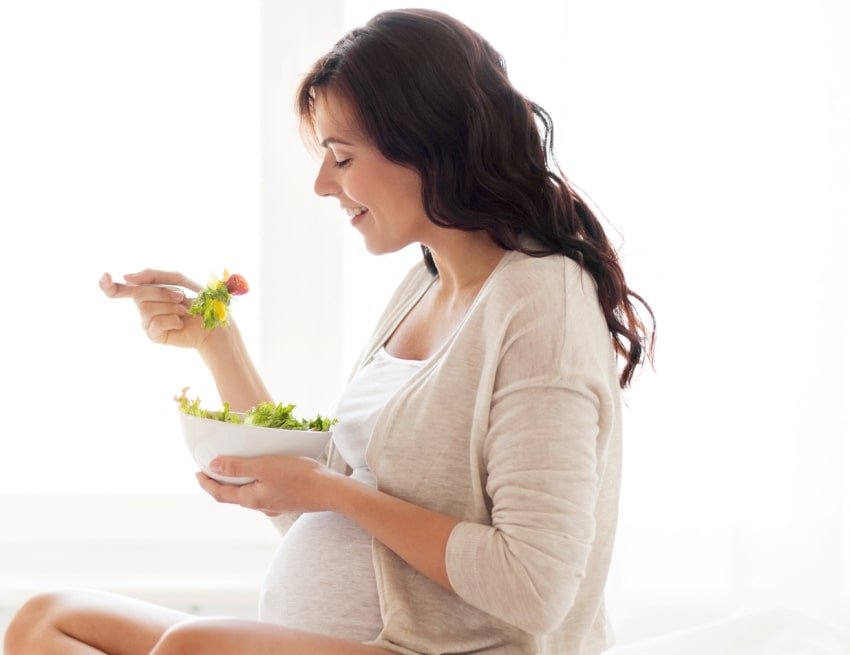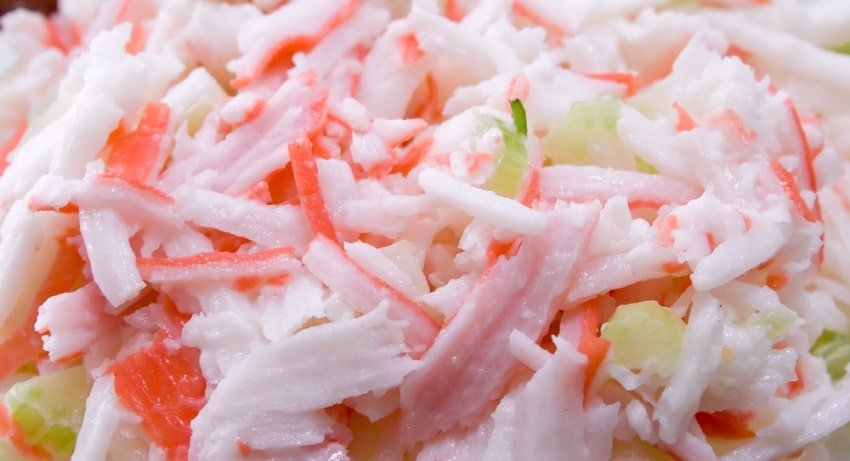When you are pregnant, you must be careful with the food you eat, the medication that you take, and even the lotions that you use on your skin as there is the risk that these could cross the placenta to your unborn baby.
Many foods will be prohibited for consumption when you are pregnant such as undercooked or raw fish, raw eggs, organ meat, and unpasteurized milk or cheese. The reason behind many of these is due to a higher chance of catching several infections like Salmonella and Listeria, which can potentially have serious effects on both mother and baby.
With that in mind, can pregnant women eat imitation crab?
The simple answer to that question would be: yes. It is usually safe for a pregnant woman to eat imitation crab. Imitation crab is usually cooked, so there are fewer chances for there to be issues with things like food poisoning.
However, you need to check that there are no raw products in foods such as sushi. Imitation crab does not contain as much omega-3 fatty acids that are hugely beneficial during pregnancy. They can help to prevent pre-term labor and lower the risk of preeclampsia.
View in gallery
Benefits of Eating Imitation Crab While Pregnant
There are many benefits of eating imitation crab while you are pregnant, and I don’t just mean it’s the economical price tag.
- Imitation crab is low in both fat and calories, which is fantastic if you are watching your weight while pregnant. It is also great if you are watching your cholesterol.
- Three ounces of imitation crab contains only a measly one gram of fat and 81 calories. This low fat, low-calorie food would be a great addition to your pregnancy diet and could potentially help as an afternoon snack to help prevent blood sugar highs and lows.
- It contains relatively low levels of mercury if it is made with surimi. Mercury is a heavy metal contaminant that is found in certain fish species like mackerel, swordfish, and marlin.
- High levels of mercury can have detrimental effects on your unborn baby by damaging the development of their nervous system.
- Imitation crab also contains a high level of phosphorous. It aids in the correct functioning of the kidneys and muscles of our body and it makes up 1% of our total body weight. Phosphorous also helps to support healthy nerve functions and ensures a regular heartbeat.
The recommended daily dose of phosphorous for adults is 700 mg and three ounces of imitation crab will contain 240 mg.
Disadvantages of Eating Imitation Crab While Pregnant
Imitation crab is a good alternative to real crab. It lowers the possibility of food poisoning from undercooked crabmeat but it also has some disadvantages for your health as a pregnant woman. One of the biggest health disadvantages is the amount of salt or sodium that is contained in the imitation crab.
- While it is recommended that during your pregnancy you increase your sodium intake, going above this limit is unsafe. The amount of sodium intake should be limited to 2,400 mg per day. In a three-ounce serving of imitation crab, there is 715 mg of sodium.
- Though there is no need to restrict your sodium intake while you are pregnant, too much sodium can have side effects on your health. These can include high blood pressure or preeclampsia. It could also lead to water retention and swelling of the ankles, feet, hands, and face.
- Imitation crab may look and taste like fresh crab, but it does not contain the same amount of protein and has very low protein content. Three ounces of imitation crab has just 65 mg of protein while three ounces of crab meat has a protein content of 20 g.
- Imitation crab does have a very high carbohydrate content of almost 12 g per three ounces. While this would make it unsuitable for those pregnant women suffering from celiac disease, it is not recommended that pregnant women cut their carbohydrate intake.
- Carbohydrates are easily broken down into sugars such as glucose. These can be easily passed across the placenta and provide your growing baby with much-needed energy.
- Imitation crab often contains additives such as MSG and other preservatives. These can be harmful to both you and your baby. It also contains excess sugar, which is something that you should be watching while pregnant.
- The excess sugar content would also make it unsuitable for women suffering from Gestational diabetes.
Simple Ways to Include Imitation Crab in Your Diet
If you are able to eat imitation crab and have consulted your doctor then there are some quick and simple ways to take advantage of the nutrients that are found in it.
You could make a quick sandwich filling by combining imitation crab meat with some herbs and mayonnaise. Or you could throw in some chunks of imitation crab into your green salad. You could add it to vegetable soup or you could make a lovely dip by adding small chunks of imitation crab to low-fat Greek yogurt, some pepper, and herbs.
You do need to watch your portion sizes with regard to sodium intake.
View in gallery
Can You Eat Crab Sticks While Pregnant?
Now because you have been given the green light to eat imitation crab while pregnant it does not mean that other forms of crab are okay. Crab sticks are a big no no while pregnant as it is very difficult to determine exactly what type of fish has been used to make them.
If you are craving seafood and imitation crab is just not hitting the spot, there are some recommended seafood that is considered safe to consume during pregnancy. The FDA recommends that you eat 2 to 3 servings per week of cooked, low mercury fish, such as:
- catfish
- crab
- crawfish
- freshwater trout
- haddock
- lobster
- pollock
- salmon
- scallops
- shrimp
- whitefish
It is also advised that pregnant women can have 1 serving per week of the following seafood:
- mahi-mahi
- bluefish
- tuna (albacore, white or yellow)
- carp
- snapper
- Chilean sea bass
- tilefish
Our Conclusion
The short answer is yes. Although there are some ingredients that you would need to be careful with, regarding portion size such as sodium. If you do not fancy imitation crab, there are plenty of other safe alternatives listed above.
Just because you are pregnant and may not be able to enjoy the foods that you did pre-pregnancy, it does not mean that you can not try new things or safe alternatives.






